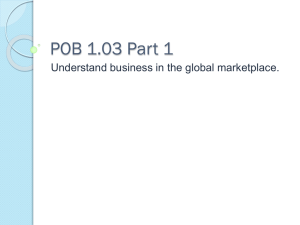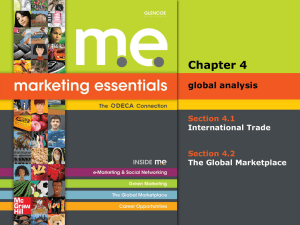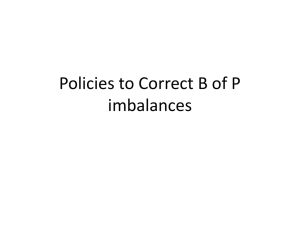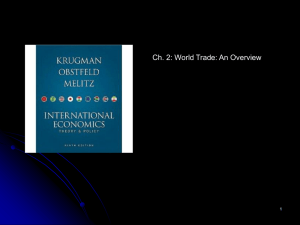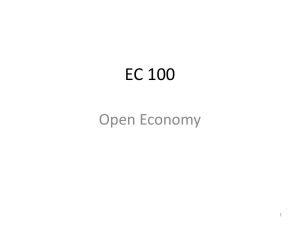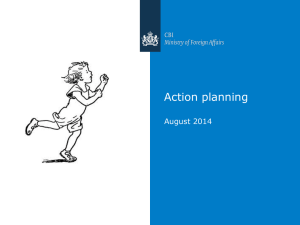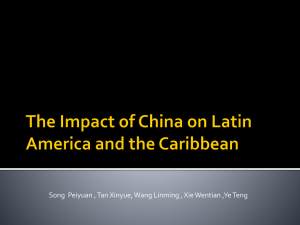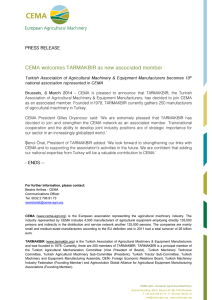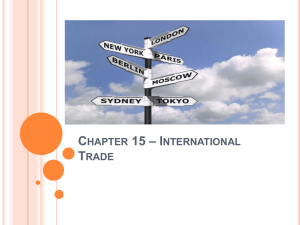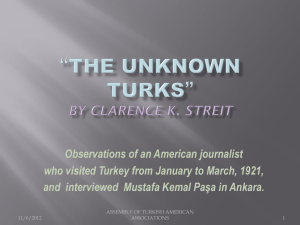Turkey`s Neighbourhood Policy
advertisement
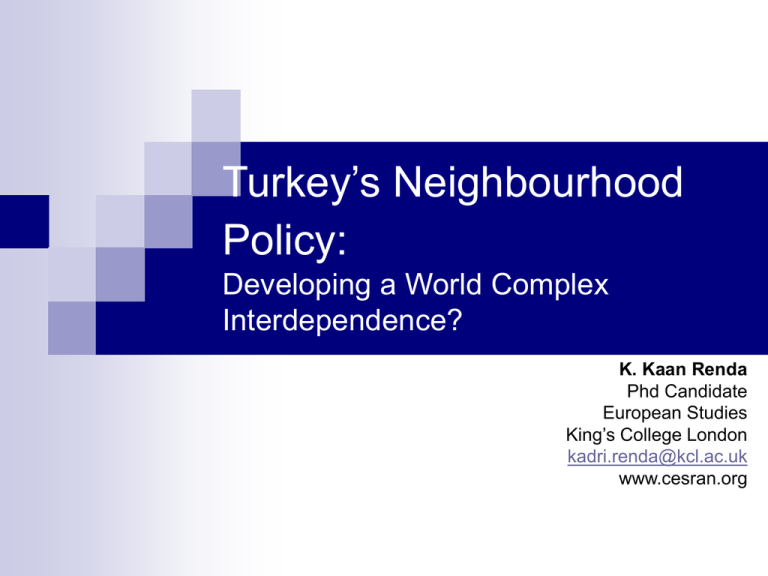
Turkey’s Neighbourhood Policy: Developing a World Complex Interdependence? K. Kaan Renda Phd Candidate European Studies King’s College London kadri.renda@kcl.ac.uk www.cesran.org Introduction Realism in IR Complex interdependence General characteristics of Turkish Foreign policy Recent developments and activism Concluding remarks Q&A 2 Realist theory States as unitary and dominant actors Survival and security are the main objectives Hierarchy of issues: High politics v. Low politics Power = Material capabilities = Military force National interests are pre-given Conflict and competition persistent 3 4 Complex Interdependence Basic Features: Multiple Channels Absence of hierarchy among issues Secondary role of military force 5 Complex Interdependence (continued): Multiple Channels: Transgovernmental relations Transnational relations Support for Multilateralism 6 Complex Interdependence (continued): Absence of Hierarchy among Issues Extensive foreign agendas Security issue is relegated Rise of different domestic groups National interests less clearly defined Cooperation possible and becomes a norm 7 Complex Interdependence (continued): Secondary role of Military Force: Change in threat perceptions Diplomacy and other civilian instruments praised Military power is the last resort 8 Complex Interdependence (continued): Types of Leadership and Role: Hegemonic leadership: Dominant role Unilateral leadership: unilateral policies and bilateral relations Multiple leadership: multilateral policies, mediator and facilitator role, displaying a good example 9 Complex Interdependence (continued): Sensitivity: the speed and magnitude with which a change in one country is felt in another country. Vulnerability: the relative availability and costliness of alternative policy frameworks, when it becomes necessary to adapt to external changes. 10 Turkish Foreign Policy General characteristics of TFP in 1990s: Geostrategic concerns Threat perceptions Military strategy Domestic politics 11 Geostrategic concerns: Dominated by realpolitik and geopolitical concerns: Cold war mentality Power politics: strong army and readiness to use of force Searching for a new role 12 Threat perceptions: Threats are everywhere: Domestic and international threats National unity and integrity (milli birlik ve beraberlik) Terrorism Hostile neighbours Surrounded by threats Suspicion and mistrust Security was the main concern Security-consumer 13 Military strategy: Military strategy focused on: Containment of hostile neighbours through alliances and threat of use of force Fighting against terrorism Strong army and strong state was vital for survival Highly cautious 14 Domestic politics: State-centric National Unity and integrity (milli birlik ve beraberlik) Coalition governments Military’s role in foreign policymaking 15 Recent Developments Foreign Policymaking Economic activism Diplomatic activism 16 Foreign policymaking Civilianization: Democratization: Desecuritization: 17 Economic activism Creating a circle of business partners Web of bilateral agreements More pragmatic and economy oriented Rise of trading state after the twin economic crisis in 2000 and 2001: need for new markets Role of stable and consolidated economy Energy hub Possibility of economic regime and economic integration 18 Trade statistics (1) Source: IMF Year 1999 2000 2001 2002 2003 2004 2005 2006 2007 2008 Partner country Flow Armenia Exports 0 0 0 0 0 0 0 0 0 0 Imports 0 0 0 0 0 0 391k 40k 56k 1.489 Exports 248k 230k 225k 231k 315k 403k 528k 695k 1.046 1.667 Imports 440k 956k 780k 646k 122k 135k 272k 340k 329k 928k Exports 233k 252k 299k 380k 621k 892k 1.179 1.567 2.060 2.151 Imports 295k 465k 393k 508k 689k 955k 1.190 1.661 1.949 1.840 Exports 114k 131k 144k 103k 155k 199k 271k 407k 645k 997k Imports 932k 155k 127k 137k 273k 302k 302k 344k 289k 525k Exports 406k 437k 476k 590k 920k 1.166 1.126 1.602 2.262 2.429 Imports 287k 430k 266k 312k 427k 592k 726k 1.044 950k 1.150 Exports 157k 235k 360k 333k 533k 810k 912k 1.066 1.386 2.029 Imports 635k 815k 839k 920k 1.860 1.961 3.469 5.626 6.613 8.199 Exports 0 0 0 0 829k 1.815 2.748 2.589 2.811 3.916 Imports 0 0 0 0 112k 467k 458k 375k 644k 1.320 Exports 232k 184k 281k 266k 410k 393k 551k 609k 797k 1.115 Imports 307k 545k 463k 506k 413k 357k 272k 187k 376k 639k Azerbaijan Bulgaria Georgia Greece Iran Iraq Syria 19 Trade statistics (2) Source: IMF Partner count ry Flow 1999 2000 2001 2002 2003 2004 2005 2006 2007 2008 Russian Exports 588k 643k 924k 1.172 1.367 1.858 2.377 3.237 4.727 6.483 Imports 2.374 3.886 3.435 3.891 5.451 9.027 12.869 17.806 23.506 31.364 Exports 585k 650k 805k 861k 1.083 1.309 1.466 1.529 1.658 1.935 Imports 298k 505k 529k 544k 459k 714k 803k 782k 1.081 1.447 Exports 15.420 15.664 17.545 20.416 27.397 36.524 41.365 47.930 60.406 63.394 Imports 22.529 28.526 19.823 25.688 35.140 48.077 52.629 59.338 68.589 74.803 Exports 1.049 901k 1.031 1.203 1.527 2.150 2.558 3.365 4.429 6.558 Imports 1.075 1.787 1.879 1.823 2.075 3.012 3.786 4.714 5.702 6.490 Exports 2.225 2.031 2.575 2.735 4.511 6.797 8.986 9.881 13.186 23.330 Imports 2.299 3.543 3.221 3.310 4.861 6.194 8.836 11.790 12.017 16.003 Israel EU AFRICA Middle East 20 Diplomatic activism Dynamic and assertive diplomacy Soft power From staunch alliances to flexible alliances Mediator role, problem-solver, pivotal role in regional politics More cooperative and constructive Normalisation of relations with neighbours 21 Concluding remarks Expanding the Turkish sphere of influence From “tolerating and deterring neighbours” to “good neighbourly relations” Analytical problems of complex interdependence model Lack of emphasis on the effects of identity and culture Too much economy-oriented Practical problems of new activism in Turkish foreign policy Problems of zero problem with neighbours policy Economical and institutional capacity Over-stretching: Breaking the bow Over-confidence and declining tolerance to opposition Seen rhetorical and opportunitist: Lack of concrete results Domestic problems constrain Turkish role in the region 22 Selected Bibliography: Aydin, M. (1999). "Determinants of Turkish Foreign Policy: Historical Framework and Traditional Inputs", Middle Eastern Studies 35(4): 152-186. Aydin, M. (2000). "Determinants of Turkish Foreign Policy: Changing Patterns and Conjunctures During the Cold War", Middle Eastern Studies 36(1): 103-139. Aydin, M. (2003b). "Securitization of History and Geography: Understanding of Security in Turkey", Southeast European and Black Sea Studies 3(2): 163-184. Bilgin, P. (2005). "Turkey's Changing Security Discourses: The Challenge of Globalisation", European Journal of Political Research 44(1): 175-201. Karaosmanoglu, A. L. (2000). "The Evolution of the National Security Culture and the Military in Turkey", Journal of International Affairs 54(1): 199-216. Keohane, Robert O. and Nye, Joseph S.(1989). Power and Interdependence, USA: Harper Collins Publishers, 2. Edition. Kirisci, K. (2006). Turkey's Foreign Policy in Turbulent Times. Chaillot Paper. Paris: Institute for Security Studies. Oguzlu, H. T. (2004a). "The Impact of 'Democratization in the Context of the EU Accession Process' on Turkish Foreign Policy ", Mediterranean Politics 9(1): 94-113. Oguzlu, H. T. (2007). "Soft Power in Turkish Foreign Policy", Australian Journal of International Affairs 61(1): 81-97. Robins, P. (2007). "Turkish Foreign Policy since 2002: Between a 'Post-Islamist' Government and a Kemalist State", International Affairs 83(2): 289-304. 23 Thank you very much! kadri.renda@kcl.ac.uk www.cesran.org 24
